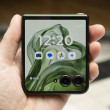Review: iPhone 4
Screen
The "Retina" display, as Apple calls it, is nothing short of amazing. Pull up a photo of an ice cream cone on a hot summer day and just try not to lick it. I dare you. It's simply luscious. Glossy magazine photos have nothing on this.
What makes it so great is the high resolution, or pixel density. It may only be twice the resolution of the last generation iPhone on each axis (four times counting both dimensions) but up close, it seems like even more of an improvement than that. Apple has truly leapfrogged the competition with this display.
The higher pixel density is a huge boon in several specific places, like maps and the web browser. You can zoom all the way out and still read the text on phonescoop.com, for example. Photos look fantastic, of course.
The display technology is TFT LCD, which is not as exotic as newer OLED technology, but Apple is using a type of LCD panel called IPS, which is notable for its wide viewing angle, meaning you can view it from a side angle without the image washing out or turning psychedelic on you. Indeed, comparing it side-by-side with the iPhone 3GS, the image does look better from a steep angle. It's only the color that benefits, though. Brightness still falls off dramatically when viewed from anything other than straight-on, just like on the 3GS. Still, IPS is an improvement that makes it a tad nicer to show off photos and videos to friends, for example.
The display performs well both indoors and out. It's reasonably legible outdoors in daylight, at least as well as any other phone, including the 3GS. In 100% direct sun, it's not as reflective - and therefore not nearly as visible - as the display on the iPhone 3GS. That's only when the sun is right over your shoulder, though; turn a little to the left or right and it becomes much easier to see.
Signal
When it comes to voice, the signal performance rated no better or worse than the 3GS. That's not a compliment. In just a day of use each, we both experienced multiple dropped or failed calls. Color us unimpressed. The signal meter doesn't exaggerate. If you only have two bars, you may be able to make a call, but don't expect to hold onto it for long. Some people have reported worse performance making calls with the phone in their left hand; Philip was able to replicate that, but Rich was not.
Data was another story entirely. It was blazing fast and, so far, very reliable. Apple has clearly concocted some new magic to make this one of the fastest - if not the fastest web browsing phones on the market. Again. I really had no idea AT&T's 3G network could send me web pages over the ether so fast; apparently all it needed was the right phone on the receiving end. A new standard had been set.
Sound
A frequent complaint with previous iPhones has been speakerphone volume. Fortunately, the iPhone 4 has a louder speakerphone. It's not dramatically louder, but the boost is noticeable and definitely helps. Speakerphone sound quality is good. Music and ringers get a volume boost as well, although it's not as noticeable with lower-pitch ringers. When the ringers are turned off, the vibrate feature on the iPhone felt a bit weak, so beware when you slip it into deep padded pockets.
Apple touts noise cancellation as a new feature. This technology uses a secondary microphone - away from your mouth - to listen to background noise and filter it out. We tested it in a noisy bar, and it worked great. The party at the other end could tell we were in a bar, but could hear us loud and clear over the din.
Unfortunately, the earpiece is far too quiet to hear the other party in any remotely noisy environment. In a quiet place or with light background noise, all is fine, but expect to step outside the bar to take a call, or put your finger in your other ear walking down a noisy street. So while the noise cancellation works, it's rather pointless with such a weak earpiece.
Volume aside, call sound quality was good in both directions.



















 Apple iPhone 4 (GSM)
Apple iPhone 4 (GSM)








